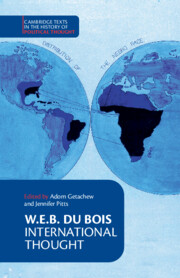Book contents
- W.E.B. Du Bois: International Thought
- Cambridge Texts In The History Of Political Thought
- W.E.B. Du Bois: International Thought
- Copyright page
- Contents
- Figures
- Acknowledgments
- Note on the Text
- Democracy and Empire
- Select Chronology of William Edward Burghardt Du Bois
- Book part
- 1 The Present Outlook for the Dark Races of Mankind (1900)
- 2 To the Nations of the World (1900)
- 3 The African Roots of War (1915)
- 4 Of the Culture of White Folk (1917)
- 5 Letter from W. E. B. Du Bois to President Woodrow Wilson (1918)
- 6 To the World (Manifesto of the Second Pan-African Congress) (1921)
- 7 Worlds of Color (1925)
- 8 Liberia and Rubber (1925)
- 9 Liberia, the League and the United States (1933)
- 10 Where Do We Go from Here?
- 11 Inter-Racial Implications of the Ethiopian Crisis: A Negro View (1935)
- 12 The Clash of Colour: Indians and American Negroes (1936)
- 13 The Union of Colour (1936)
- 14 What Japan Has Done (1937)
- 15 Black Africa Tomorrow (1938)
- 16 The Realities in Africa: European Profit or Negro Development? (1943)
- 17 Prospect of a World without Race Conflict (1944)
- 18 Colonies and Moral Responsibility (1946)
- 19 A Cup of Cocoa and Chocolate Drops (1946)
- 20 An Appeal to the World: A Statement of Denial of Human Rights to Minorities
- 21 Colonies as Cause of War: Address to the World Peace Congress, Paris (1949)
- 22 On the West Indies: Address of Dr. W. E. B. Du Bois at the St. Thomas Chamber of Commerce (1952)
- 23 To the World Peace Council, Budapest (1953)
- 24 Colonialism and the Russian Revolution (1956)
- Index
10 - Where Do We Go from Here?
Address at the Rosenwald Economic Conference in Washington, D.C. (1933)
Published online by Cambridge University Press: 10 November 2022
- W.E.B. Du Bois: International Thought
- Cambridge Texts In The History Of Political Thought
- W.E.B. Du Bois: International Thought
- Copyright page
- Contents
- Figures
- Acknowledgments
- Note on the Text
- Democracy and Empire
- Select Chronology of William Edward Burghardt Du Bois
- Book part
- 1 The Present Outlook for the Dark Races of Mankind (1900)
- 2 To the Nations of the World (1900)
- 3 The African Roots of War (1915)
- 4 Of the Culture of White Folk (1917)
- 5 Letter from W. E. B. Du Bois to President Woodrow Wilson (1918)
- 6 To the World (Manifesto of the Second Pan-African Congress) (1921)
- 7 Worlds of Color (1925)
- 8 Liberia and Rubber (1925)
- 9 Liberia, the League and the United States (1933)
- 10 Where Do We Go from Here?
- 11 Inter-Racial Implications of the Ethiopian Crisis: A Negro View (1935)
- 12 The Clash of Colour: Indians and American Negroes (1936)
- 13 The Union of Colour (1936)
- 14 What Japan Has Done (1937)
- 15 Black Africa Tomorrow (1938)
- 16 The Realities in Africa: European Profit or Negro Development? (1943)
- 17 Prospect of a World without Race Conflict (1944)
- 18 Colonies and Moral Responsibility (1946)
- 19 A Cup of Cocoa and Chocolate Drops (1946)
- 20 An Appeal to the World: A Statement of Denial of Human Rights to Minorities
- 21 Colonies as Cause of War: Address to the World Peace Congress, Paris (1949)
- 22 On the West Indies: Address of Dr. W. E. B. Du Bois at the St. Thomas Chamber of Commerce (1952)
- 23 To the World Peace Council, Budapest (1953)
- 24 Colonialism and the Russian Revolution (1956)
- Index
Summary
This address to the Rosenwald Economic Conference in 1933 brings together in a single analytic frame the struggles of African Americans under relentless racial oppression in the United States and those of independent Black states such as Liberia and Haiti. Focusing on African Americans’ dire economic condition during the Depression, it argues that even if they were able to found an independent state they would be unable to escape the domination of concentrated capital. While expressing admiration for communism in Russia, it rejects the Communist Party in the United States as ill-equipped to tackle the role of racism in maintaining African Americans’ economic privation. It proposes instead that African Americans resist participating in the white American economy and pioneer an economic revolution consisting of non-profit industry; collectively funded provision of services, especially medical and legal; and “intelligent cooperating consumers” committed to buying only goods produced by fairly compensated labor.
- Type
- Chapter
- Information
- W. E. B. Du Bois: International Thought , pp. 117 - 130Publisher: Cambridge University PressPrint publication year: 2022

